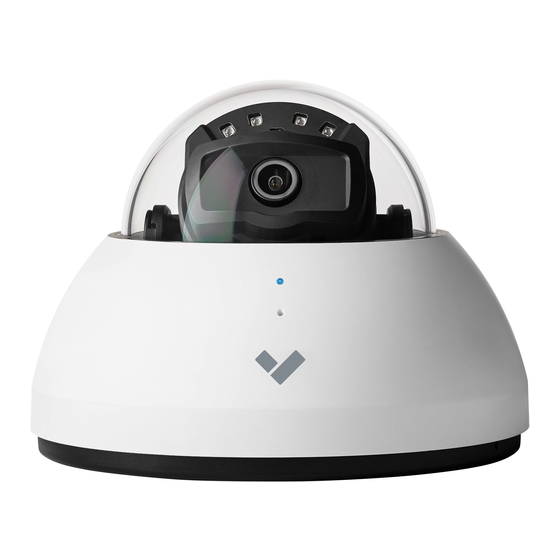
Advertisement
Quick Links
Advertisement

Summary of Contents for Verkada CD41
- Page 1 CD41 Outdoor Dome Camera Setup...
-
Page 2: Table Of Contents
In the box What you’ll need Connect Contents Mount Adjust Secure Support... -
Page 3: In The Box
In the box 1 CD41 outdoor dome camera 1 Mount plate 1 Mounting template 1 T10 security torx screwdriver 1 22mm Cable gland wrench 4 Mounting screws and wall anchors CD41 Outdoor Camera 1 Conduit adapter 2 Pole straps 1 Desiccant pack... - Page 4 4” Square junction box European junction box Single gang junction box 3.5” Round junction box Level Line 4” Round junction box Pole mount straps Verkada ACC-MNT-3 accessory Mount plate Mounting template 4 screws Desiccant Conduit adapter 2 pole straps 4 wall anchors...
-
Page 5: What You'll Need
What you’ll need • A working internet connection • 802.3af Power over Ethernet (PoE) switch, or a PoE injector. For operation below -20° C, use 802.3at PoE. • A smartphone or laptop • A #2 Phillips screwdriver or power drill with a #2 Phillips driver bit •... -
Page 6: Connect
Connect Use the provided T10 security torx security screwdriver to loosen the screws and lift the cover. - Page 7 Insert the ethernet cable into ethernet port. Scan the Go to www.verkada.com/start QR code for easy camera registration and setup, or proceed to www.verkada.com/start. Connect -...
-
Page 8: Mount
Mount Mount the camera on a wall or ceiling. Try to keep the camera 8 to 10 feet above the ground. - Page 9 For best night vision, avoid overhangs or obstructions. These may reflect the camera’s IR illumination and reduce the image clarity in night mode. Mount -...
- Page 10 To remove the mount plate, loosen the Use the provided mounting template to mark mount plate screws and twist the camera wall mount holes. For a junction box mount, counter-clockwise. Lift the camera vertically use the mounting template to determine the off the base plate and set aside.
- Page 11 ⁄ inch ⁄ inch For a solid material like wood or metal, drill For drywall, drill 1/ 4 inch holes. Insert plastic 1/8 inch pilot holes. Drive mounting screws anchors into holes and drive mounting directly into the pilot holes. screws into anchors.
- Page 12 Through-hole Cable gland Rubber seal Assembly Plastic collar Metal nut To seal the ethernet cable, disassemble the cable gland and feed the ethernet cable through the baseplate through-hole.
- Page 13 Place the rubber seal around the cable. Push Firmly insert the seal and collar assembly into the plastic collar firmly over the rubber seal the pass-through until it is secured in position. until it snaps into position.
- Page 14 Place the metal nut over the rubber seal and Gently tighten down the metal nut by hand. engage the threads on the pass-through. You should still be able to move the cable back and forth through the gland, but have enough resistance for it to remain in place.
- Page 15 Gently pull the cable through the through-hole so it has some slack, but will not interfere with the top cover. Pulling the ethernet cable too tight will strain the cable gland and risk water leakage. Too much slack in the ethernet cable will create top cover installation issues and risk water leakage.
- Page 16 Firmly tighten using the provided wrench.
- Page 17 To secure the camera, place it over the mount plate Plug in the camera. The status LED will turn orange screws and twist counter-clockwise. Tighten the to indicate the camera has power. The LED will turn mount plate screws with a Phillips screwdriver. blue to indicate the camera is active.
-
Page 18: Adjust
60˚ 350˚ Adjust 350˚ Adjust your camera to the desired viewing angle. Use the online stream to confirm image orientation. Image can be flipped 180˚ online in Command. - Page 19 Lens Face Image orientation Image Orientation Default image orientation is indicated by markings on the lens face. Video orientation is also adjustable from within the Verkada application. Adjust -...
-
Page 20: Secure
Secure Open and remove the desiccant pack from its outer pouch. Peel the backing from the double- sided tape on the desiccant pack. Place the pack directly on to the “Attach desiccant here” text on the interior camera shell. - Page 21 To secure the camera, align the top shell security holes with the baseplate and place the top shell back into its original position. Tighten the security screws using the provided T10 security torx screwdriver. Secure -...
-
Page 22: Support
Thank you for purchasing a Verkada camera. If for any reason things don’t work right or you need Support assistance, please contact us immediately. Sincerely - The Verkada Team www.verkada.com/support... - Page 23 NOTE: 1. Maintenance and repair work must always be carried out by qualified technical personnel. Disconnect power from the unit when performing a maintenance task. 2. Wiring methods used for the connection of the equipment to earth shall be in accordance with the National Electrical Code, ANSI/NFPA 70, and the Canadian Electrical Code, Part 1, CSA C22.1.
- Page 24 For additional support please contact us directly at +1 (833) 837-5232 or support@verkada.com...











Need help?
Do you have a question about the CD41 and is the answer not in the manual?
Questions and answers